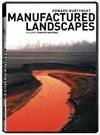|
|
||||
|
|
by Donald Levit  Portrait-subject of Canadian Jennifer Baichwal’s Manufactured Landscapes, Edward Burtynsky soft-spokenly soft-pedals the implications of his photographs exhibited internationally in prestigious museums. Appearing throughout the documentary alongside frames of Burtynsky and team taking them in context, the often nearly monochromatic images fascinate like the snake, a color beauty mark surrounded by at times unidentifiable ugliness. Best Canadian Feature at 2006 Toronto, selected now for Sundance, and included in the Lincoln Center 18th Annual Human Rights Watch International Film Festival, the sobering work opens with minutes of a marvelous, at first puzzling, sideways traveling shot across China’s “The Factory of the World/The Channel of the World.” To emotionless clack, screen-vertical green tables seat armies of yellow-clad workers assembling plastic gizmos -- a recurrent motif -- who then mass to be harangued parallel to Charles Sheeler nightmare rows of low-rises. Pan upwards to the photographer’s forklift crane, his voice approving the shot, not happy with the late afternoon light, musing on “the new, different landscape of our time, defining who we are.” Almost ninety minutes later, that voice will return to the same theme, in tones that seem straightforwardly unironic here and in the earlier intervening moments of his exhibition talks, “not to glorify or damn [or] politicize . . . our changing the air, land, water, the nature of this planet.” Childhood impressions of an automotive plant south of Heavy industry globalization, it is stressed, thrives on maritime transportation of mass cargo, although scant footage is devoted to the oceans themselves. Rather, stills and film concentrate on man and terra firma and, to a lesser extent, runoff ground water, rivers, lakes and reservoirs, the latter of which is more developed in the seventeen-year, 2.3-kilometer-long Three Gorges Dam project. Aimed to cut floods, provide transportation, and satisfy rampant energy demands by displacing 1.1 million people and thirteen full-size cities of the plain with a reservoir double the length of Lake Ontario, the polemical dam is, with an out-of-place film visit to urban renewal in Shanghai, really the only construction to rival the Great Wall in supposed visibility from the Moon. But instead, documentary concentration is on smaller, also deleterious activities and structures. There are, for example, the repeated non-curvilinear geometric abstractions that could be Piet Mondrian creations but, still and motion picture cameras moving back for perspective, are seen to be blocks of compacted junk metal; or, mocked for an instant by a tiny incongruous gilt mask, mounds for recycling of wheels and gears, diodes and plastic circuit breakers, wire, chips and conduits, motherboards and lead solder, scavenged through by masked workers and leaching noxious stuff into unnaturally colored earth; larger though still normally hidden from view is the dun symmetry of open pit mines, stripped mountainsides, square-hewn quarries and, closer to home, the concrete rectangles of urban rubble. Aside from the sci-fi standby mutants menacing the mankind which caused them, the screen has left environmental alarm to print voices like those of Rachel Carson, Thor Heyerdahl and Buckminster Fuller, or outdoorsy singer-songwriters Judy Collins, John Denver or Pete Seeger. One film here or there might collaterally celebrate nature, indeed, but not until late in the current non-fiction phenomenon have filmmakers earnestly turned lenses towards planetary wake-ups. Not preaching through narration, but evenhandedly showing through sometimes epic-scale imagery, Baichwal -- and through her, countryman Burtynsky -- poses a vital question. How high a price is humanity willing to pay for what it has, wants more of and simply cannot give up? (Released by Zeitgeist Films; not rated by MPAA.) |
||
|
© 2026 - ReelTalk Movie Reviews Website designed by Dot Pitch Studios, LLC |



